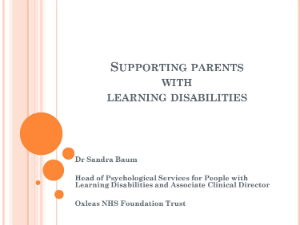 Dr Martin Stevens is Senior Research Fellow at the Social Care Workforce Research Unit. (1,037 words)
Dr Martin Stevens is Senior Research Fellow at the Social Care Workforce Research Unit. (1,037 words)
There is increasing interest in supporting parents with learning disabilities, as evidenced by the good turnout at the Social Care Workforce Research Unit’s most recent practice seminar on 24 June. Our seminar series focusing on learning disabilities covers a wide range of topics, but this one on parents with learning disabilities reflected the relevance of the subject to practitioners working in both adult and children’s services. Sandra Baum, the seminar presenter, estimated that most (two-thirds) child and family social workers have a parent with learning disabilities on their case loads. Dr Baum is head of learning disabilities psychological services and associate clinical director (LD) at Oxleas NHS Foundation Trust.
 In addition to co-authoring many articles and key guidance books, Sandra (pictured right) has substantial practice experience. Her work involves assessments, which include IQ tests alongside functional assessment of Daily Living Skills. She acknowledged that there is a serious question about the usefulness of IQ tests in assessing parents’ suitability. If the IQ score is over 55 (as it often would be), then a wide range of other factors need to be taken into account in order to make an assessment. This raises a question about the value of the IQ test as part of an assessment for parents’ suitability.
In addition to co-authoring many articles and key guidance books, Sandra (pictured right) has substantial practice experience. Her work involves assessments, which include IQ tests alongside functional assessment of Daily Living Skills. She acknowledged that there is a serious question about the usefulness of IQ tests in assessing parents’ suitability. If the IQ score is over 55 (as it often would be), then a wide range of other factors need to be taken into account in order to make an assessment. This raises a question about the value of the IQ test as part of an assessment for parents’ suitability.
While many of those attending the seminar had practice experience of supporting parents with learning disabilities, Sandra noted that estimating the number of parents with learning disabilities is very difficult, largely because of differences in definitions used. Partly, this is because this can be an ‘invisible’ population, as many individuals seek to avoid the label ‘learning disabilities’ and reject any input from social services. And different definitions of learning disability are employed by social workers working with adults, and by child and family social workers. Estimates vary from 25,000-250,000.
Sandra reported research findings that most (60%-90%) women with learning disabilities want to get married and have children. In a similar vein to employment outcomes, it has been found that parents with learning disabilities can parent successfully, with the right kinds of social support. Again, as with employment, successful parenthood provides a positive identity, satisfaction and pride.
Sandra discussed factors that affect parenting by people with learning disabilities, some of which are similar to factors increasing the likelihood of parental abuse:
- Living in poverty (people with learning disabilities are especially likely to be poor)
- Being isolated and victimised (many parents who end up neglecting or abusing their children are very isolated or have experienced abuse)
- Poor models of parenting (many abusive parents have not been parented well themselves)
- Difficult relationship histories (many parents with learning disabilities will have had difficult past relationships)
- Insufficient social support (this is a critical problem, and has serious effects on ability to parent)
- Increased psychological distress (unsurprisingly, many parents with learning disabilities are more distressed than non-disabled parents)
- Services often do not look beyond the label of ‘LD’ (ignoring other abilities and social context).
Children of adults with learning disabilities may be more at risk of neglect or developmental delay, rather than active abuse, but Sandra reported that research shows that levels of learning disability and perceptions of need do not increase the risk of harm for children of people with learning disabilities. A rather familiar set of factors increase risk:
- Childhood trauma of parent
- Their own special needs (physical disability)
- Raising a child with special needs
- Male partner has a higher IQ and/or antisocial behaviour and is engaged in criminal activity.
Many (40-60%) children of people with learning disabilities are taken into local authority care and 10% are removed at birth, which is a 15-50 times higher likelihood than for parents without learning disabilities. Sandra argued that too much emphasis is given to IQ tests in court hearings. Citing her own research, she described the emotional impact on parents, and highlighted the lack of support offered to help with grieving that followed the loss of a child.
 Much evidence is developing about the effectiveness of parenting interventions, particularly those which are behavioural in approach, breaking down tasks and teaching parents at home, where they will be implementing the learning. The need for long-term support was stressed. Other factors are important, including motivation and interest in the child. In her presentation (left, 27 slides) Sandra described key guidance and other documents relating to support for parents with learning disabilities. She also identified a range of good accessible tools for supporting parents with learning disabilities that use easy-read and line drawings. These can complement behavioural teaching methods:
Much evidence is developing about the effectiveness of parenting interventions, particularly those which are behavioural in approach, breaking down tasks and teaching parents at home, where they will be implementing the learning. The need for long-term support was stressed. Other factors are important, including motivation and interest in the child. In her presentation (left, 27 slides) Sandra described key guidance and other documents relating to support for parents with learning disabilities. She also identified a range of good accessible tools for supporting parents with learning disabilities that use easy-read and line drawings. These can complement behavioural teaching methods:
- My Pregnancy, My Choice (CHANGE, 2008).
- You and Your Baby 0-1 (CHANGE, 2010, 2012).
- You and Your Little Child 1-5 years (CHANGE, 2007).
Sadly, services across the UK vary, with few offering specialist assessment and support for parents with learning disabilities, and some offering virtually nothing at all. It is also unclear which part of which services (i.e. child or adult) should pay for support, whether there should be pooled budgets, and whether it is financially feasible for funding to be long term.
https://www.youtube.com/watch?v=ExGnbs4Xw2Q
Most people with learning disabilities want to become parents and many are having children, although it is hard to estimate numbers. If people are known to services, they are likely to receive some kind of support. However, there is a high risk of children being taken into local authority care. Specialist services are few; many have been mainstreamed, especially since the financial cuts. The impact of financial austerity on prevention and on support was a strong theme in the discussion. Many thought that the result would be that more children would be taken into care. At the same time there is evidence that training interventions can be successful and there are some very positive stories (as an example see the YouTube clip above, which Sandra showed during the seminar).
Dr Martin Stevens is Senior Research Fellow at the Social Care Workforce Research Unit in the Policy Institute at King’s. You can follow up the references in this post via Dr Baum’s presentation.
About the Learning Disability Services Seminar series at King’s
Sixty-eight people attended this seminar, the last one in the current series, which has covered subjects raised by practitioners as important to practice, and ones where they would value learning more so they can improve their knowledge and skills.
Options for the next series are being considered and we will provide early notification of dates, times, and subjects. Please contact Martin if you wish to receive details
martin.stevens@kcl.ac.uk | @MartinStevens2 | @scwru